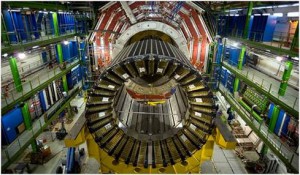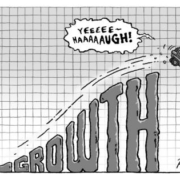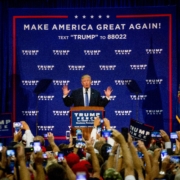The Higgs Boson and the Steady State Economy
By Brent Blackwelder
 What does the Higgs boson have to do with the establishment of a sustainable economy? The discovery of this subatomic particle required a Herculean effort, involving billions of dollars, over 1,000 physicists, and thousands of craftsmen to construct and operate an almost incomprehensibly complex machine — the Large Hadron Collider. The same kind of diligent, prodigious effort is needed to construct and operate a new economic system for all nations of the world.
What does the Higgs boson have to do with the establishment of a sustainable economy? The discovery of this subatomic particle required a Herculean effort, involving billions of dollars, over 1,000 physicists, and thousands of craftsmen to construct and operate an almost incomprehensibly complex machine — the Large Hadron Collider. The same kind of diligent, prodigious effort is needed to construct and operate a new economic system for all nations of the world.
Physicist Lawrence Krauss, author of A Universe from Nothing, described the effort on the Higgs boson in ebullient terms:
…a triumph of technical and computational wizardry of unprecedented magnitude…
…cathedrals and colliders are both works of incomparable grandeur that celebrate the beauty of being alive…
…the discovery will change our view of ourselves and our place in the universe. Surely that is the hallmark of great music, great literature, great art… and great science.
Amid such extraordinary hype, it’s worth asking what we have to show for finding the so-called God particle? Will this momentous discovery help solve any crucial economic, social, environmental, or political problems besetting societies today and even threatening the livability of the planet? Will we possess the “key to the universe” and still wreck the planet we depend on?

If we can build the LHC, there’s hope for the SSE.
The most urgent task for humanity is the focus of the Center for the Advancement of the Steady State Economy: a transformation of the existing world economy. Today’s global economy rewards the depletion of natural resources, promotes overuse of fossil fuels, drives huge numbers of species to extinction, and turns a blind eye on the destruction of the very ecosystems that make life possible.
The transformation required in this emergency situation was described by economist Kenneth Boulding roughly half a century ago — the same period when physicists were formulating hypotheses about mystery particles. The essential change, Boulding said, was a move from “cowboy economics” (the unsustainable economics of continuous growth and resource overexploitation) to “spaceship economics” (the sustainable economics of the steady state).
Scientists specializing in ecosystem health warn that Earth is like a patient in the emergency room needing CPR — conservation, preservation, and restoration. The latest climate science reveals alarming physical changes to the planet — changes that are even more disturbing than the warnings issued in the big 2007 report of the Intergovernmental Panel on Climate Change (IPCC). Here are a few such changes:
- The oceans are warming 50% faster than predicted;
- Greenhouse gas emissions are tracking the worst-case scenario;
- Oceans are acidifying at the fastest rate in 300 million years;
- Sea levels are projected to be over 3 times as high, and the melting of the Greenland Ice Sheet would raise ocean levels 20 feet;
- The earth is on track for an average warming of 7 degrees centigrade by 2100 — enough to produce massive agricultural failures.
We need a Herculean effort on both economic and ecological fronts to deal with climate destabilization. How many ecological economists are at work on a redesign of the global economy? What about the paucity of scientists who study the variety of life and the functioning of ecosystems? We do not know if there are 10 million species on Earth or 50 million.
In contrast, consider the stupendous volume of data being gathered by the supercollider. Dr. Krauss reports that this collider generates more data every second than the information in all the world’s libraries. The physicists got the billions they needed, but only a little progress has been made in developing spaceship economics. In fact, mainstream economics is reinforcing both the cowboy and casino thinking that is gripping most economies on Earth.
Physicists did not face a slick disinformation campaign funded by oil companies. Surely the job of rescuing our planet from an untimely demise should rank high in the funding priorities. Lester Brown estimates that $200 billion a year — less than a fifth of the world’s defense department budgets — is needed to shift to a clean-energy economy and do the CPR that planet Earth desperately needs.





Dear Dr./M.A./MSc/MBA/Eng./Mr. Blackwelder:
Thank you very much for this article.
I fully agree with the whole ideas and statements available in this post.
We must reassess/reevaluate/rethink/think over/reconsider our scientific priorities as an “intelligent” species carrying out a senseless, unethical and extremely risky “experiment” on this planet.
So many scientists, I am sure, will say that science is free to go wherever it wants… Not anymore…In orther words, we have not much time to play to be a scientist…
We must develop a real sustainability science…The current one looks like a complicated application of environmental sciences to different kind of environmental issues.
As for the “Primordial ‘Soup:’ Big Bang Conditions Recreated In Particle Colliders” –
http://www.huffingtonpost.com/2012/07/20/primordial-soup-big-bang-particle-collider_n_1688243.html?utm_hp_ref=science&ncid=edlinkusaolp00000008
Physicists say: “We have a new state of matter for which we can write down the mathematical law governing its properties in a single line, but after 30 years of theoretical research, we still do not understand its microscopic structure even in rough terms,” said theoretical physicist Berndt Müller at Duke University in Durham, N.C. “The reason for this is that we still lack the mathematics that would allow us to predict the structure and properties of the quark-gluon plasma starting from its basic physics law. We can calculate some of its properties by means of raw computer power, but that does not tell us how it works.”
So, I would also say that , as concern a real sustainability science, we still lack the mathematics that would allow us “to model” how an intelligent species interact, through its inventions-institutions like “international” political system and economics, with the natural (biotic and abiotic) systems on a planet. This is complex problem to solve because we must “observe” how we interact and measure changes…
Particle physics is hard…Quantum mechanics is hard…A real sustainability science harder..!
Besides the sustainable development concept (SDC) is getting hard/difficult to understand what really means or, at least, try to mean… Rio+20 is the best example of how ambiguous/equivocal/vague/uncertain/doubtful/obscure/unmane and unmanageable this concept has became.
Having said that, I would point out we (humankind) has a formidable task ahead…
Regards,
On Twitter: HL_Villagran
If you want to know more about me, please follow this instructions:
Go to Google Search
Type as it looks “HL_Operational Bio”
Once you are there “click” on the PDF file
This is a 2008 version which is public on the web. I have available updated versions. This will be useful in the meantime.
Thanks.!
On Twitter: @HL_Villagran
The discovery of the Higgs Boson is a necessary step in the evolution of our understanding and our awareness. It provides us with hard data to use to reconstruct…perhaps all material things. But is also opens up our eyes to provide us with the vision ahead; that is not about the ability to reconstruct all material things. We are a magnificant species but fall within the same realm as the gnat for our survival. If we remain earthlings, as the gnat, then we are dependent upon a functioning earth for economic wealth and livelihood. After we peer deeper into the space of that relatively large atom, we emerge to an awareness that it is our economic system that effects our small universe at our time present, rather than the Higgs Boson. We must reconstruct the micro-economic system and gravitate toward symbiotic demand; the recently discovered subtle force that has the capacity to reverse the acceleration of the deconstruction of our natural capital.
I like your observation and I share your opinion re what constitutes the “most urgent task for humanity”. Unfortunately, we are members of a woefully small minority. Hence, I do not look to standard politics, given that both sides of the aisle actualy “like” (wish to reinvigorate) our economic structures. Nonetheless, I am stubbornly optimistic that our species will eventually become or evolve into (though perhaps with much anguish and gnashing of teeth) an animal capable of creating and managing economic structures that are sustainable and equitable, benefitting not only the species, but gaia. We’ve just got a ways to go yet.
For now, just another thanks to you, Herman Daly et al. Every thoughtful prod you publish may provide the necessary “butterfly wings” to trigger something larger.